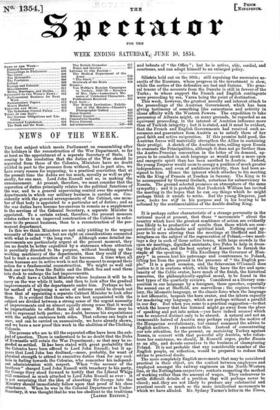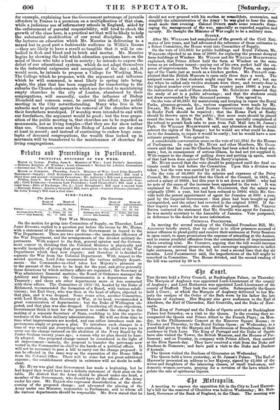It is perhaps rather characteristic of a strange perversity in
the national mood at present, that those " movements " about the country which have the greatest semblance of action are evidently less likely to be productive of results than those which are com- paratively of a scholastic and spiritual kind. Nothing could ap- pear to be more stirring than the meetings at Sheffield and Bir- mingham on the subject of the regeneration of Poland,—two meet- ings a day in each of those active towns, with large crowds in the open air meetings, dignified assistants, live Poles to help in dress- ing the platform, and the best oratory of Kossuth to furnish the staple of the speaking. "His Excellency the Governor of Hun- gary" in person lent his patronage and countenance to Poland, lifting her from the ground in the presence of " the English peo- ple." It is a great occasion' and the Sclavonian O'Connell does justice to it in orations which, while they have the fire and spon- taneity of the Celtic orator, have much of the finish, the historical resources, the philosophically-applied moral, to be found in the best types of the quarterly reviews. Considered as a literary com- position in our language by a foreigner, these speeches, especially the second one at Sheffield, are marvellous ; the copious vocabu- lary, the idiomatic language, or the classic force when the language is not idiomatic, bespeak the born orator, and the inborn capacity for masgering any language, which are perhaps without a parallel in our day. But when you come to a practical suggestion—to that which the hearer that has listened might go away from the place of speaking and put into action—you have indeed counsel which can be rendered distinct only to be absurd. A natural and not an inexcusable hatred of Austria may perhaps explain the motive of the Hungarian revolutionary, but cannot commend the advice to English auditors. It amounts to this. Instead of concentrating our sole attention, for the present, on sustaining Turkey against Russia, in concert with that powerful ally Austria, who volun- teers her assistance, we should, M. Kossuth urges, prefer Russia as an ally, and devote ourselves to the business of championing Poland. It is not probable that any considerable number of the English people, on reflection, would be prepared to reduce that advice to practical deeds. The more completely English movements that may be considered practical in their object, are the contest between employers and employed amongst the railway engineers on the North-Western line, or the Nottingham carpenters; contests respecting the method of working rather than the amount of wages. They endeavour to settle difficult details of a problem that will perhaps never be closed; and-they are not likely to produce any substantial and, practical result so much as the more intellectual movements to which we have alluded. Mr. Sydney Turner's letter in the Times, for example, explaining how the Government patronage of juvenile offenders in France is a premium on,a multiplication of that class, while a judicious use of reformatory schools in England, aided by the enforcement of parental responsibility, will tend to check the growth of the class here, is a practical act that will be likely to help the substantial modification of our penal discipline. Bo with the lectures on education which Mr. Maurice is delivering to a mixed but in good part a fashionable audience in Willis's Rooms —they are likely to have a result so tangible that it will be em- bodied in flesh and blood and in brick and mortar. Mr. Maurice begins by showing the hold which education questions have on the mind of those who take a lead in society ; he intends to expose the defect of our educational systems, which do not adapt themselves to the industrial exigencies and occupations of the day ; and, it would seem, he intends to propose a College for Working Men. The College which he proposes, with the argument and influence which he will command, is most likely to spring into being. Again, the plan that has been suggested for transferring to the suburbs the Church-endowments which are devoted to maintaining empty churches in the city of London, abandoned by their congregations, will assuredly, under the influence of Bishop Blomfield and common sense, be carried into effect ; the public meeting in the City notwithstanding. Many who live in the suburbs met to protest against the removal of the churches where their forefathers worshiped. If worship were intended to end with our forefathers, the argument would be good ; but the true propo- sition of the public meeting is, that churches are to be regarded as monuments, not as living temples—that they are for show rather than use. Common sense and the Bishop of London are for once at least in accord ; and instead of continuing to endow huge ceno- taphs of deceased congregations, the wealth thus locked up in mortmain will be transferred to the maintenance of churches for living congregations.



























